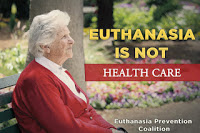Executive Director - Euthanasia Prevention Coalition
Sign our petition: Saying NO to assisted suicide. (Link).
California citizens were, once again, protected from assisted suicide when the assisted suicide lobby failed, on May 30, in their attempt to reverse a ruling by a Superior Court Judge, that the California assisted suicide law was unconstitutionally enacted.
Bill McMorris reported in the Washington Free Beacon that:
On Wednesday Riverside Superior Court Judge Daniel Ottolia rejected a motion to vacate his decision declaring the End of Life Options Act unconstitutional. Assisted suicide supporters Compassion & Choices filed the motion on behalf of two terminally ill patients, as well as a doctor who prescribes lethal medication.Judge, Ottolia, overturned the California assisted suicide law by ruling that the legislature acted outside the scope of its authority when it enacted the End of Life Option Act in 2015.
California passed the state's assisted suicide law in a special health care funding session after the legislature failed to pass the assisted suicide bill in its normal session in 2015.
Judge Ottolia, held that:
“the End of Life Option Act does not fall within the scope of access to healthcare services,” and that it “is not a matter of health care funding.”
Since the special legislative session was to focus on healthcare spending, and since the assisted suicide law is outside of that mandate, therefore the assisted suicide law was unconstitutionally enacted.
The assisted suicide lobby will likely introduce a new bill to legalize assisted suicide.
The assisted suicide lobby will likely introduce a new bill to legalize assisted suicide.
Sign our petition: Saying NO to assisted suicide. (Link).
































